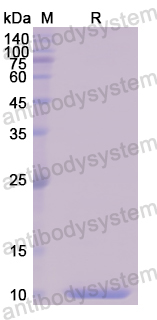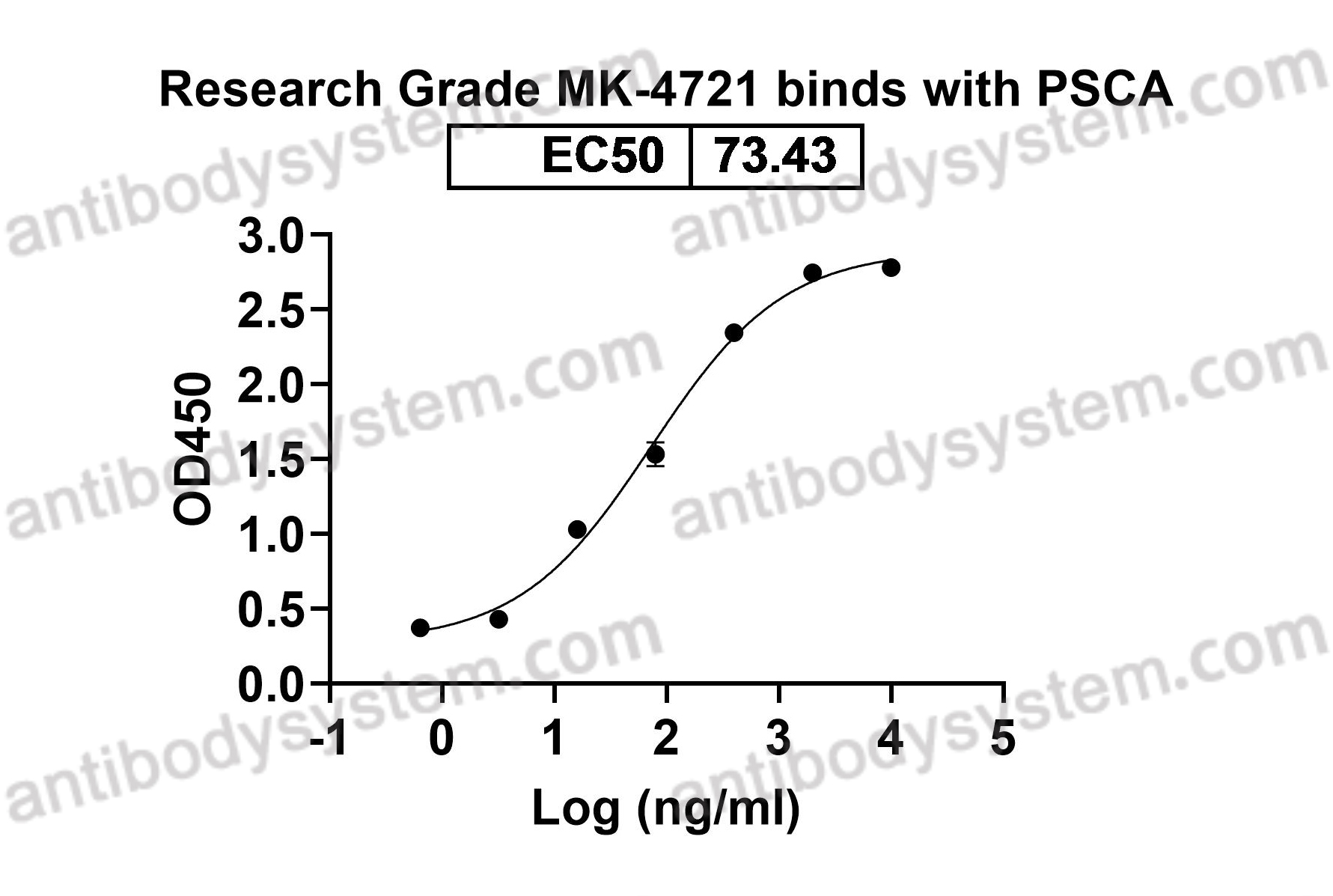Catalog No.
YHA73501
Expression system
E. coli
Species
Homo sapiens (Human)
Protein length
Leu12-Ser86
Predicted molecular weight
10.52 kDa
Nature
Recombinant
Endotoxin level
Please contact with the lab for this information.
Purity
>90% as determined by SDS-PAGE.
Accession
O43653
Applications
ELISA, Immunogen, SDS-PAGE, WB, Bioactivity testing in progress
Form
Lyophilized
Storage buffer
Lyophilized from a solution in PBS pH 7.4, 0.02% NLS, 1mM EDTA, 4% Trehalose, 1% Mannitol.
Reconstitution
Reconstitute in sterile water for a stock solution. A copy of datasheet will be provided with the products, please refer to it for details.
Shipping
In general, proteins are provided as lyophilized powder/frozen liquid. They are shipped out with dry ice/blue ice unless customers require otherwise.
Stability and Storage
Use a manual defrost freezer and avoid repeated freeze thaw cycles. Store at 2 to 8°C for frequent use. Store at -20 to -80°C for twelve months from the date of receipt.
Alternative Names
Prostate stem cell antigen, PSCA
The association between PSCA gene polymorphism and hepatocellular carcinoma risk., PMID:40495136
Association of rs2294008 (PSCA) Gene polymorphism in Urothelial Bladder Cancer of South Indian Population., PMID:40302098
Developing cell-based therapies for pancreatic ductal adenocarcinoma., PMID:40231460
Off-the-shelf invariant NKT cells expressing anti-PSCA CAR and IL-15 promote pancreatic cancer regression in mice., PMID:40231459
PSCA-targeted BPX-601 CAR T cells with pharmacological activation by rimiducid in metastatic pancreatic and prostate cancer: a phase 1 dose escalation trial., PMID:39737899
Discovery of a novel highly specific, fully human PSCA antibody and its application as an antibody-drug conjugate in prostate cancer., PMID:39113562
Potential association between PSCA rs2976395 functional variant and pancreatic cancer risk., PMID:38924078
Pan-cancer analysis of PSCA that is associated with immune infiltration and affects patient prognosis., PMID:38917176
PSCA-CAR T cell therapy in metastatic castration-resistant prostate cancer: a phase 1 trial., PMID:38867077
Human anti-PSCA CAR macrophages possess potent antitumor activity against pancreatic cancer., PMID:38663406
Designing and validating of a questionnaire measuring perceived self-care ability (PSCA) in chronic stroke patients at home., PMID:38622553
VDR, CXCR1, CXCR2, PSCA Polymorphisms and Recurrent Urinary Tract Infections in Women: Genetic Association Study., PMID:38407596
Tandem CAR-T cells targeting MUC1 and PSCA combined with anti-PD-1 antibody exhibit potent preclinical activity against non-small cell lung cancer., PMID:37660477
Spatial and temporal diversity of positive selection on shared haplotypes at the PSCA locus among worldwide human populations., PMID:37353592
The PSCA rs2294008 (C/T) Polymorphism Increases the Risk of Gastric and Bladder Cancer: A Meta-Analysis., PMID:36853840
Applicant Perspective on the Plastic Surgery Common Application (PSCA): A Cross-Sectional Analysis of the 2021-2022 National Residency Matching Program Applicant Pool., PMID:36842285
Diagnostic Efficacy of PSMA and PSCA mRNAs Combined to PSA in Prostate Cancer Patients., PMID:36708571
PSMA PET/CT guided intensification of therapy in patients at risk of advanced prostate cancer (PATRON): a pragmatic phase III randomized controlled trial., PMID:35260100
Impact of prostate-specific antigen screening on tumor size in patients with prostate cancer in a super-aging district in Kyoto, Japan., PMID:34537890
Silencing of the proteasome and oxidative stress impair endoplasmic reticulum targeting and signal cleavage of a prostate carcinoma antigen., PMID:33774280
Pre-conditioning modifies the TME to enhance solid tumor CAR T cell efficacy and endogenous protective immunity., PMID:33647456
GWAS of peptic ulcer disease implicates Helicobacter pylori infection, other gastrointestinal disorders and depression., PMID:33608531
The Anti-Proliferative Effect of a Newly-Produced Anti-PSCA-Peptide Antibody by Multiple Bioinformatics Tools, on Prostate Cancer Cells., PMID:33176663
Polymorphisms PSCA rs2294008, IL-4 rs2243250 and MUC1 rs4072037 are associated with gastric cancer in a high risk population., PMID:33128686
The Correlation between PSCA Expression and Neuroendocrine Differentiation in Prostate Cancer., PMID:33029516
Serum total prostate-specific antigen (tPSA): correlation with diagnosis and grading of prostate cancer in core needle biopsy., PMID:32815673
[The role of retinal microcirculation disorders in the progression of glaucomatous optic neuropathy]., PMID:32779457
Evolutionary History of the Risk of SNPs for Diffuse-Type Gastric Cancer in the Japanese Population., PMID:32664326
Evaluation of [131I]I- and [177Lu]Lu-DTPA-A11 Minibody for Radioimmunotherapy in a Preclinical Model of PSCA-Expressing Prostate Cancer., PMID:32661830
Association of MUC1 5640G>A and PSCA 5057C>T polymorphisms with the risk of gastric cancer in Northern Iran., PMID:32660489
Risk of gastric ulcer contributed by genetic polymorphisms of PSCA: A case-control study based on Chinese Han population., PMID:32640304
In Pursuit of Stability Enhancement of a Prostate Cancer Targeting Antibody Derived from a Transgenic Animal Platform., PMID:32546687
Regenerative potential of prostate luminal cells revealed by single-cell analysis., PMID:32355025
Real time ultrasound molecular imaging of prostate cancer with PSMA-targeted nanobubbles., PMID:32348874
Bovine papillomavirus prostate cancer antigen virus-like particle vaccines are efficacious in advanced cancers in the TRAMP mouse spontaneous prostate cancer model., PMID:32016503
Association between PSCA, TNF-α, PARP1 and TP53 Gene Polymorphisms and Gastric Cancer Susceptibility in the Brazilian Population., PMID:31983162
Impact of PSCA Polymorphisms on the Risk of Duodenal Ulcer., PMID:31839644
A PSCA/PGRN-NF-κB-Integrin-α4 Axis Promotes Prostate Cancer Cell Adhesion to Bone Marrow Endothelium and Enhances Metastatic Potential., PMID:31722969
Impacts of the prostate stem cell antigen (PSCA) and Clostridium perfringens enterotoxin (CPE) on the apoptosis and cell cycle regulatory genes in PC3., PMID:31478797
Impact of PSCA gene polymorphisms in modulating gastric cancer risk in the Chinese population., PMID:31416884
Low-serum prostate-specific antigen level predicts poor outcomes in patients with primary neuroendocrine prostate cancer., PMID:31376193
An oligo-His-tag of a targeting module does not influence its biodistribution and the retargeting capabilities of UniCAR T cells., PMID:31332252
DNA vaccination via RALA nanoparticles in a microneedle delivery system induces a potent immune response against the endogenous prostate cancer stem cell antigen., PMID:31299353
Prostate Stem Cell Antigen Gene Polymorphism Is Associated with H. pylori-related Promoter DNA Methylation in Nonneoplastic Gastric Epithelium., PMID:31213476
[89Zr]A2cDb Immuno-PET of Prostate Cancer in a Human Prostate Stem Cell Antigen Knock-in (hPSCA KI) Syngeneic Model., PMID:31209779
Contribution of prostate stem cell antigen variation rs2294008 to the risk of bladder cancer., PMID:31008939
A Dual-Modality Linker Enables Site-Specific Conjugation of Antibody Fragments for 18F-Immuno-PET and Fluorescence Imaging., PMID:30877181
GWAS analysis reveals a significant contribution of PSCA to the risk of Heliobacter pylori-induced gastric atrophy., PMID:30753327
Dual-Modality ImmunoPET/Fluorescence Imaging of Prostate Cancer with an Anti-PSCA Cys-Minibody., PMID:30613270
Quantum dot-based fluorescent probes for targeted imaging of the EJ human bladder urothelial cancer cell line., PMID:30546399


